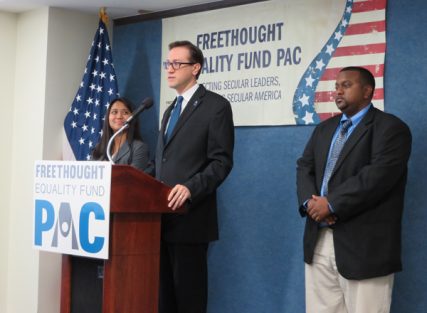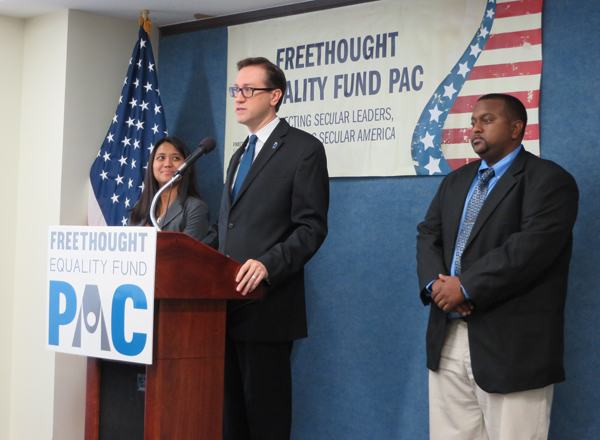
Roy Speckhardt, executive director of the American Humanist Association and the Center for Humanist Activism, speaks at the launch of a new political action committee during a Washington news conference today (Sept. 18). Maggie Ardiente (left), director of development and communications at the American Humanist Association, and Bishop McNeill (right), coordinator for the Freethought Equality Fund PAC, listen on. RNS photo by Katherine Burgess
WASHINGTON (RNS) Atheists and humanists hope to increase their influence in politics with the launch of the Freethought Equality Fund, a new political action committee for nonbelievers.
“When people see respected ethical humanists and atheists serve in public office, this will begin to dispel many myths about nonbelievers,” said Bishop McNeill, coordinator of the new PAC that was launched Wednesday (Sept. 18).
The mission of the PAC is to grow the ranks of open humanists and atheists in public office at all levels of government. It will also seek to elect people who support the separation of church and state regardless of their personal beliefs, said Maggie Ardiente, director of development and communications at the American Humanist Association.
On a larger scale, the new PAC reflects a long-term strategy among nonreligious activists to increase their profile in Washington; last year the Secular Coalition for America hired Edwina Rogers, a veteran Republican lobbyist, as its executive director, in part to open doors on Capitol Hill.
The PAC was launched by the American Humanist Association’s Center for Humanist Activism; it’s the first nontheist PAC to have full-time paid staff and start-up funds.
A 2012 Pew study reported that one in five Americans do not claim any religious affiliation, an increase of 5 percentage points during the past five years.
“Our patriotism is suspect, our value system is dismissed and the more we come out of the closet in certain communities as people who don’t happen to believe in a god, the more we observe new limitation in our business opportunities and in public life,” said Ardiente, referring to prejudice against the nonreligious. “Most of all, these voters want respect and equality for nontheists in the United States.”
Roy Speckhardt, executive director of the American Humanist Association, called nonreligious Americans “one of the largest minorities in the U.S.”
“But you’d never know it from our organized numbers or political power,” he said. “It’s time for that lack of representation to change.”
Organizers of the PAC said there are more than 24 nontheists currently in Congress, although freshman Rep. Kyrsten Sinema, D-Ariz., is the only member of Congress to publicly identify her religion as “none.”
Before an endorsement, the PAC will question candidates about personal beliefs, whether the theory of intelligent design should be taught in public schools and whether public funds should support religiously affiliated organizations, as well as questions about gay rights and abortion rights.
The PAC is currently considering five potential candidates for endorsement and financial support: congressional candidates Lee Rogers of California and state Sen. Will Brownsberger of Massachusetts, both Democrats, as well as incumbent House Democrats Bobby Scott of Virginia, Rush Holt of New Jersey and Judy Chu of California.
According to an initial PAC questionnaire and survey, no incumbent Republicans in Congress qualified for support from the Freethought Equality Fund. However, the group’s organizers said they hope to find Republicans who support their values.
Candidate support from the PAC includes making contributions of up to $5,000 per election, making independent expenditures on advertising, and recruiting volunteers and donors for a campaign.
“It is long past due for nonbelievers to have a say in who we want to represent us as our elected officials,” McNeill said. “Through careful research of potential candidates, the Freethought Equality Fund seeks to be at the forefront of the battle to erase the negative stigma associated with atheism or humanism by having the ability to influence political elections.”
Connie Mackey, president of FRC Action, a political action committee affiliated with the Family Research Council and that supports mostly Republicans, said although she disagrees with the premise of the Freethought Equality Fund, all PACs are welcome.
“The vast majority of Americans do believe in God,” Mackey said. “They want their elected officials to be held accountable to a higher authority, not just themselves.”





